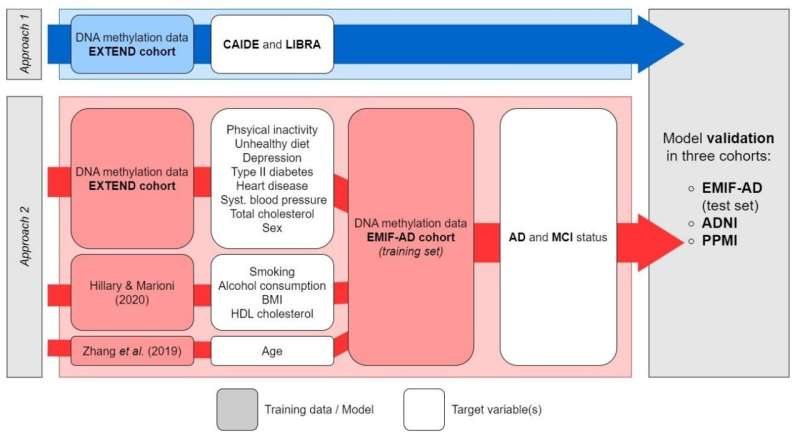This article has been reviewed according to Science X's editorial process and policies. Editors have highlighted the following attributes while ensuring the content's credibility:
fact-checked
peer-reviewed publication
trusted source
proofread
Epigenetics blood markers can help understand dementia risk

Recent research suggests that epigenetic markers in the blood could be useful for understanding dementia risk. Two linked papers from the University of Exeter and Maastricht University have together progressed research to show the potential for DNA methylation, an epigenetic marker, in understanding how genetics and lifestyle factors influence dementia risk.
DNA methylation is a chemical tag added to DNA, which can turn genes on and off. Genetic and lifestyle factors can alter the levels of the DNA methylation tag on genes, with some of these factors already known to increase the risk of developing dementia. By assessing DNA methylation, this can help scientists understand the extent to which these different factors influence risk of dementia and the mechanisms by which they bring about disease.
In the largest study of its kind, researchers assessed DNA methylation at 800,000 sites in the genome in blood samples collected from 900 people in the European Medical Information Framework for Alzheimer's disease Multimodal Biomarker Discovery (EMIF-AD MBD) study.
The study includes extensive clinical information on participants, who all provided spinal fluid samples, which have been used for diagnosis and monitoring of Alzheimer's disease, because it is in direct contact with the brain. However, collecting the fluid is an invasive procedure, so the team investigated whether they could instead use blood samples, through analyzing blood epigenetic signatures that are associated with Alzheimer's disease biomarkers, as this would be cheaper and easier to collect in practice.
In the first of the two papers, led by Professor Katie Lunnon at the University of Exeter Medical School, the team showed that DNA methylation signatures in blood can mirror some protein biomarker levels in spinal fluid samples, which are used for assessing dementia. The team explored these signatures in conjunction with 15 different spinal fluid biomarkers that are used for diagnosing dementia and showed changes in the methylation status of key genes for a number of these biomarkers.
The first paper is titled "Blood DNA methylomic signatures associated with CSF biomarkers of Alzheimer's disease in the EMIF-AD study. Alzheimer's and Dementia." The findings are published in the journal Alzheimer's & Dementia.
In a second paper in the same journal, led by Dr. Ehsan Pishva at Maastricht University in the Netherlands, the team generated epigenetic risk scores using blood DNA methylation signatures as a proxy for 14 known dementia risk factors. Some of these were modifiable lifestyle risks, including physical activity, diet and some were non-modifiable, such as age and having heart disease.
The second paper is titled "Blood-based multivariate methylation risk score for cognitive impairment and dementia. Alzheimer's and Dementia."
They showed that their epigenetic risk scores can improve the prediction of the risk of cognitive decline and dementia onset, even at early stages. Early detection is crucial to better lifestyle management, and to accessing potential new treatments. The paper highlights how genetic, lifestyle, and environmental factors are contributing to the development and progression of dementia through epigenetic mechanisms.
Professor Katie Lunnon, at the University of Exeter Medical School, is lead author on one of the studies, and leads the Dementia Genomics Team who have previously published a number of pioneering papers exploring epigenetics in the brain and blood in different dementias. She said, "We know that a number of genetic and lifestyle factors can increase the risk of developing Alzheimer's disease and other dementias. Epigenetics is a particularly exciting research field because it can mediate the interaction between our genetic makeup, which is fixed at conception, and environmental risks, which we can potentially modify."
Dr. Ehsan Pishva, at Maastricht University, who led the other paper and leads the Dementia Systems Biology team, said, "Our epigenetic risk score can improve the prediction of risk of cognitive impairment in different populations, marking a significant advancement in dementia research. The study, which involved advanced analysis of large epigenetic datasets from multiple independent dementia cohorts, found that the epigenetic risk score was a predictor of future cognitive decline in Alzheimer's disease and Parkinson's disease cohorts.
"Our findings highlight the potential of using blood-derived epigenetic measurements as a non-invasive approach to assess dementia risk, paving the way for future studies to explore more personalized and preventive health care strategies in tackling cognitive impairment."
More information: Rebecca G. Smith et al, Blood DNA methylomic signatures associated with CSF biomarkers of Alzheimer's disease in the EMIF‐AD Multimodal Biomarker Discovery study, Alzheimer's & Dementia (2023). DOI: 10.1002/alz.080072
Jarno Koetsier et al, Blood‐based multivariate methylation risk score for cognitive impairment and dementia, Alzheimer's & Dementia (2024). DOI: 10.1002/alz.14061



















